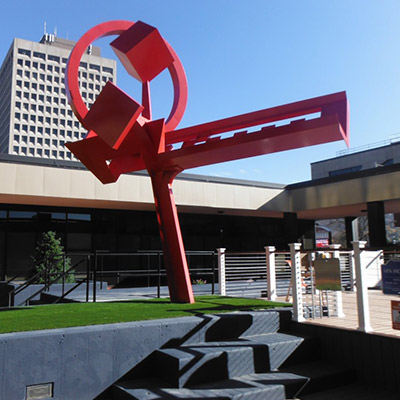“This is for you, Alan,” his widow, Marisa Crabb, said to the audience at Sarah Jane Johnson Memorial United Methodist Church in Johnson City before conducting in his stead. Two of the three pieces had Welsh connections in honor of Crabb, who was born in Wales.
Opening with a magnificent Mack Wilberg arrangement of J. Wyeth’s Welsh hymn, Come, Thou Fount of Every Blessing, the Downtown Singers then revived Nanie, a Brahms work performed by the chorus in 1989, 1998 and 2005. Through mythological references, Brahms’ text described the struggle of Man on earth and his fear of nothingness after death.
The featured work was contemporary Welsh composer Karl Jenkins’ Requiem in only one of two known performances in the United States this year. The piece is scored for chorus with strings, minimal brass and Japanese instruments such as shimmery bells, drums and the shakahachi, a flute played by guest artist Nora Nohraku Suggs. The ancient woodwind sounds exactly like a Native American flute but looks like a bass recorder or digiridoo.
As with his other massive work, The Armed Man, Jenkins incorporates musical styles from all over the world. The Requiem alternates traditional Roman Catholic Mass movements in Latin with five tender and moving Haiku poems, sung in Japanese by the chorus, soprano Brenda Dawe and treble Collin Pickett, a sixth grader from Vestal.
Dawe, an adjunct professor at Broome Community College, has a crystalline voice that carried above the entire orchestra and chorus. Unfortunately, Pickett’s small voice was difficult to hear beyond the first couple of rows. A small lapel microphone could have remedied that.
The Requiem provided many surprising moments, including a jazzy yet menacing Dies Irae, almost a rap-style Rex Tremendae, a lyrical and memorable Faure-style Pie Jesu and a haunting In Paradisum, chanted syllable by syllable by the chorus until the music slows and fades to nothing. The large orchestra, mostly musicians from the Binghamton Philharmonic Orchestra, is to be commended for its sensitive and vibrant performance.
A search for a new permanent director for the Downtown Singers is underway. I’m hoping the next leader will work a bit on improving the choir’s under-pitch intonation and tone. The sopranos’ and altos’ sound quality could be improved with some simple vocal coaching. But what the Singers lack in vocal skill is more than made up with their enthusiasm and energy. The chorus accepts all comers, no audition required, and is known as the choral home for people who just love to sing.
With her and Alan’s toddler son, Alexander, hoisted to her hip, Marisa Crabb accepted a standing ovation for the orchestra, soloists and chorus. I didn’t know Alan Crabb, but from all I’ve heard about him, I think he would have enjoyed this tribute concert immensely.




































